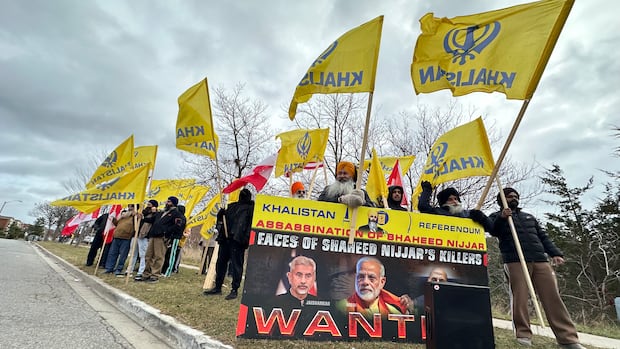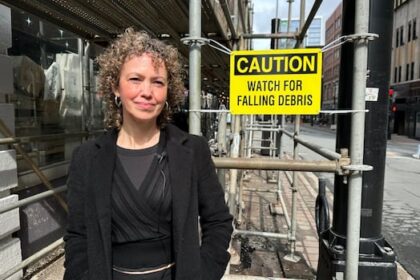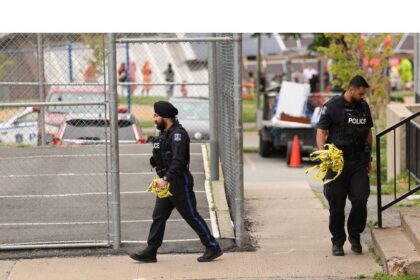PoliticsThe Khalistani group Sikhs for Justice will hold its fifth vote in Canada on Punjabi independence in Ottawa on Sunday. Previous rounds of voting have already occurred in the Vancouver, Calgary and Toronto areas, as well as in the U.S., U.K., Italy, Switzerland, Australia and New Zealand. The vote on Punjabi independence comes as Carney meets with India’s ModiEvan Dyer · CBC News · Posted: Nov 22, 2025 12:09 PM EST | Last Updated: 1 hour agoListen to this articleEstimated 6 minutesThe audio version of this article is generated by text-to-speech, a technology based on artificial intelligence.Sikhs for Justice protest in Toronto outside the Lakshmi Narayan Mandir, on Nov. 30, 2024. (Saloni Bhugra/CBC)Sikhs for Justice, whose Canadian chapter was headed by Hardeep Singh Nijjar until his assassination in 2023, will hold a referendum in Ottawa on Sunday as part of its campaign for an independent Sikh Punjab, called “Khalistan” by Sikh nationalists.The vote comes as Prime Minister Mark Carney meets with Indian Prime Minister Narendra Modi at the G20 summit in South Africa, with a possible bilateral meeting on the same day as the Khalistan referendum in Ottawa.The non-binding vote is the seventh to be held by the group in Canada since September 2022, when the first vote was held in Brampton, Ont., followed just days after by a travel advisory from India warning of a rise in “hate crimes, sectarian violence and anti-India activities” in Canada and advising Indian nationals in the country, including students, to be on the alert.There were then two rounds of voting in September and October 2023 in Surrey, B.C. Organizers claimed a turnout of 200,000. Two more rounds followed in Mississauga, Ont., in 2024, as well as a vote in Calgary. CBC News has been unable to verify the turnout numbers.Ottawa has a smaller Sikh diaspora than the Toronto and Vancouver areas, but organizers say they expect people to travel from Montreal and other areas to cast their ballots.WATCH | Who was Hardeep Singh Nijjar:Who was Hardeep Singh Nijjar, the man India is accused of killing?Hardeep Singh Nijjar was a pro-Khalistan activist and the president of a Sikh temple in Surrey, B.C. His day job was working as a plumber. For years, the Indian government called him a terrorist — a claim Nijjar repeatedly denied. So, who was Nijjar, and why did India think he was such a danger?The Indian government has previously described the referendum movement as a provocation and an attack on its sovereignty.But in response to a query from CBC News, the Indian High Commission took a more neutral line on Sunday’s event, saying in a written statement: “This is a referendum by Canadians in Canada and the High Commission has no comments to give on this issue.”On Saturday morning, Foreign Affairs Minister Anita Anand was asked by reporters at the G20 summit in South Africa what message is being sent as Carney meets with Modi on the same day as the referendum.In response, Anand said the meeting “has been contemplated for some time and it happens to be falling on the Sunday without an intention to undermine or hurt any interest domestically.””And so I want to say at the forefront of every conversation is going to be the focus on the law enforcement matters, the law enforcement dialogue [and] the issues of public safety and security at home.”Security concernsInderjeet Singh Gosal leads the Canadian chapter of Sikhs for Justice, having taken up the cause following the assassination of Hardeep Singh Nijjar in Surrey, B.C., in June 2023.Gosal, who has received a number of threats to his life, is also facing firearms charges after being arrested in September by the Ontario Provincial Police in a traffic stop in Whitby, Ont.Two other activists arrested with him saw their charges dropped as the week drew to a close, but Gosal’s charges remain. He is out on bail and will attend the referendum. Inderjeet Singh Gosal is the Sikh leader who has replaced Hardeep Singh Nijjar as head of the Khalistani referendum movement in Canada. (Marc Robichaud/CBC)Having replaced Nijjar — who was already killed for his activism, according to officials in both Canada and the U.S. — Gosal is presumed to be a target and has received warnings from the RCMP of credible and imminent threats to his life, but he has declined protection that would require him to cease his political activities.He told CBC News that his organization has taken precautions to protect Sunday’s event, which begins with voting at the McNabb Arena and Community Centre and concludes with a commemoration of the 1984 pogroms against Sikhs that killed thousands following the assassination of Indian prime minister Indira Gandhi.The voting was originally planned to take place at Billings Estate National Historic Site, but the organization announced Saturday afternoon it was being moved to the community centre “to ensure safe voter access during inclement weather.””There’s always a potential, and there are threats we’ve been receiving. So we’ve hired security. Law enforcement will be there at the event. We should be good safety-wise.”‘The shootings haven’t stopped’Like many in the Sikh community, Gosal criticized the Carney government’s decision to seek to restore normal diplomatic ties with India as premature.”You can see the extortions haven’t stopped, the shootings haven’t stopped,” he told CBC News. “If anything, they’ve gotten worse. So when we talk about bringing back the diplomats, all we did is resumed what was happening.”In a highly unusual statement issued in October 2024, and still posted on the RCMP website, the Mounties warned that “Indian diplomats and consular officials based in Canada leveraged their official positions to engage in clandestine activities, such as collecting information for the Government of India, either directly or through their proxies; and other individuals who acted voluntarily or through coercion.””Evidence also shows that a wide variety of entities in Canada and abroad have been used by agents of the Government of India to collect information. Some of these individuals and businesses were coerced and threatened into working for the Government of India. The information collected for the Government of India is then used to target members of the South Asian community.”The RCMP statement also revealed “links tying agents of the Government of India to homicides and violent acts; the use of organized crime to create a perception of an unsafe environment targeting the South Asian Community in Canada; and interference into democratic processes.”Gosal said none of that has changed. He said the RCMP contacted him two weeks ago, “and we did speak with them and it’s just nothing’s changed. If anything, it’s gotten worse.”ABOUT THE AUTHOREvan Dyer has been a journalist with CBC for 25 years, after an early career as a freelancer in Argentina. He works in the Parliamentary Bureau and can be reached at evan.dyer@cbc.ca.
Thursday, 5 Mar 2026
Canada – The Illusion
Search
Have an existing account?
Sign In
© 2022 Foxiz News Network. Ruby Design Company. All Rights Reserved.
You May also Like
- More News:
- history
- Standing Bear Network
- John Gonzalez
- ᐊᔭᐦᑊ ayahp — It happened
- Creation
- Beneath the Water
- Olympic gold medal
- Jim Thorpe
- type O blood
- the bringer of life
- Raven
- Wás’agi
- NoiseCat
- 'Sugarcane'
- The rivers still sing
- ᑲᓂᐸᐏᐟ ᒪᐢᑿ
- ᐅᑳᐤ okâw — We remember
- ᐊᓂᓈᐯᐃᐧᐣ aninâpêwin — Truth
- This is what it means to be human.
- Nokoma











